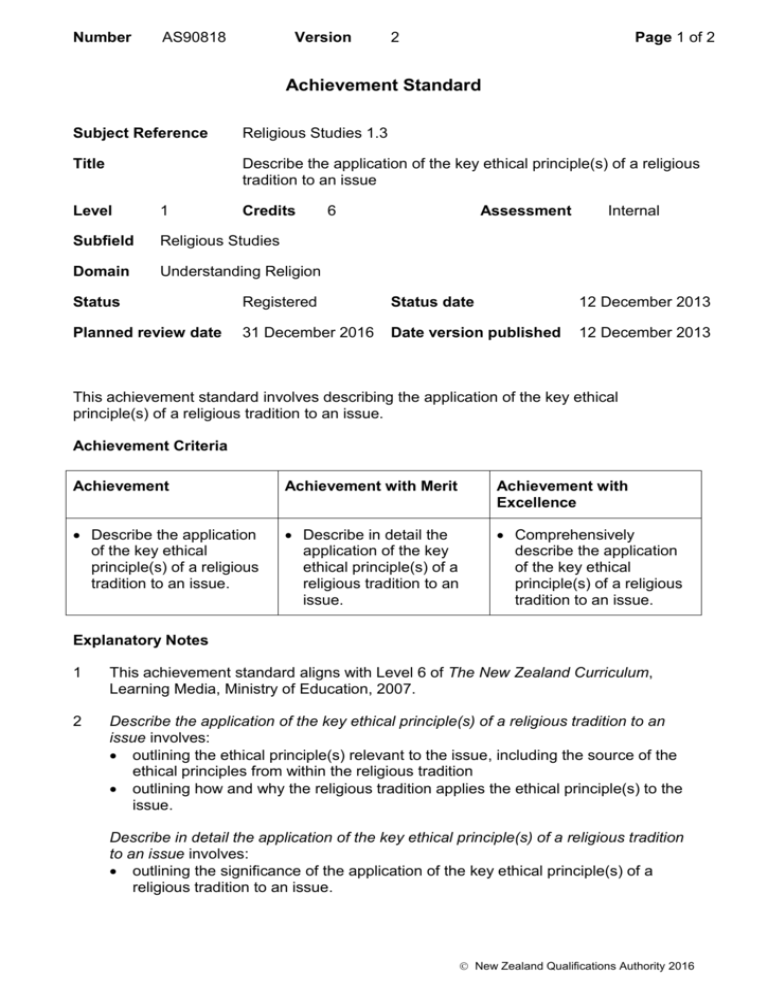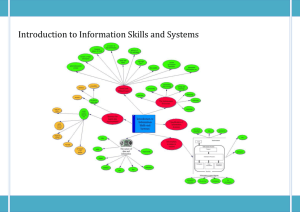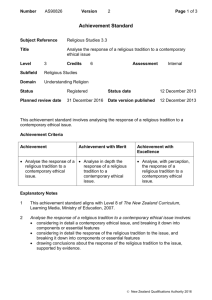of a religious tradition to an issue
advertisement

Number AS90818 Version 2 Page 1 of 2 Achievement Standard Subject Reference Religious Studies 1.3 Title Describe the application of the key ethical principle(s) of a religious tradition to an issue Level 1 Credits Subfield Religious Studies Domain Understanding Religion 6 Assessment Internal Status Registered Status date 12 December 2013 Planned review date 31 December 2016 Date version published 12 December 2013 This achievement standard involves describing the application of the key ethical principle(s) of a religious tradition to an issue. Achievement Criteria Achievement Achievement with Merit Achievement with Excellence Describe the application of the key ethical principle(s) of a religious tradition to an issue. Describe in detail the application of the key ethical principle(s) of a religious tradition to an issue. Comprehensively describe the application of the key ethical principle(s) of a religious tradition to an issue. Explanatory Notes 1 This achievement standard aligns with Level 6 of The New Zealand Curriculum, Learning Media, Ministry of Education, 2007. 2 Describe the application of the key ethical principle(s) of a religious tradition to an issue involves: outlining the ethical principle(s) relevant to the issue, including the source of the ethical principles from within the religious tradition outlining how and why the religious tradition applies the ethical principle(s) to the issue. Describe in detail the application of the key ethical principle(s) of a religious tradition to an issue involves: outlining the significance of the application of the key ethical principle(s) of a religious tradition to an issue. New Zealand Qualifications Authority 2016 Number AS90818 Version 2 Page 2 of 2 Comprehensively describe the application of the key ethical principle(s) of a religious tradition to an issue involves: outlining different perspectives from within the religious tradition of how and why the ethical principle(s) are applied to the issue describing wider implications of the application of the key ethical principle(s) of a religious tradition to an issue. 3 Religious tradition means a world religion, or a division of a world religion, or an indigenous religion. 4 A world religion is a religious belief system that is generally recognised as having independent status from any other religion. Buddhism, Christianity, Hinduism, Islam, and Judaism are examples of world religions. 5 Wider implications may be social, historical, geographical, political, or personal. 6 Ethical principle(s) of a religious tradition refer to codes of behaviour considered to be normative. 7 Sources of key ethical principles within a religious tradition include: Buddhism: the Five Precepts, the Vinaya Islam: the Qur’an, the Hadith Judaism: the Hebrew Scriptures, the Talmud Hinduism: the Four Varnas, Ashramas Christianity: the Bible, creedal statements, Conciliar statements. 8 An issue may be one, or a combination of: social eg death penalty personal eg individual moral decisions environmental eg carbon emissions political eg “just war” theory, foreign aid economic eg fair trade. 9 Conditions of Assessment related to this achievement standard can be found at www.tki.org.nz/e/community/ncea/conditions-assessment.php. Quality Assurance 1 Providers and Industry Training Organisations must have been granted consent to assess by NZQA before they can register credits from assessment against achievement standards. 2 Organisations with consent to assess and Industry Training Organisations assessing against achievement standards must engage with the moderation system that applies to those achievement standards. Consent and Moderation Requirements (CMR) reference 0233 New Zealand Qualifications Authority 2016








